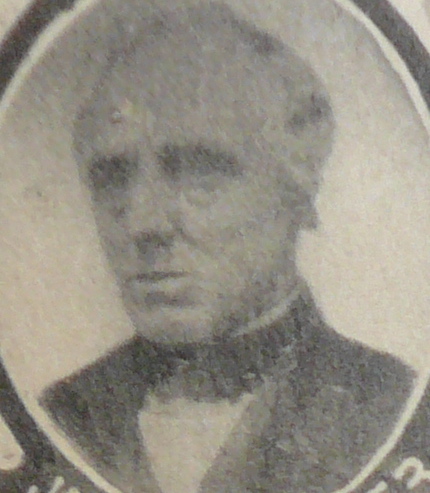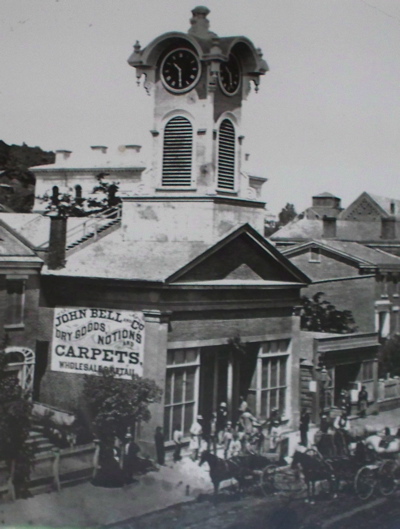Encyclopedia Dubuque
"Encyclopedia Dubuque is the online authority for all things Dubuque, written by the people who know the city best.”
Marshall Cohen—researcher and producer, CNN
Affiliated with the Local History Network of the State Historical Society of Iowa, and the Iowa Museum Association.
BELL, John: Difference between revisions
No edit summary |
No edit summary |
||
| Line 2: | Line 2: | ||
[[Image:johnbell.jpg|right|thumb|250px|Bell's wholesale and retail store with the ill-fated town clock.]]BELL, John. (Yorkshire, England, 1818-Dubuque, IA, July 29, 1896). Merchant. Bell settled in Dubuque in 1834 and spent his first winter [[MINING]]. He moved to Mansfield, Ohio, but returned to Dubuque in 1837 and operated a [[ZINC]] smelter. | [[Image:johnbell.jpg|right|thumb|250px|Bell's wholesale and retail store with the ill-fated town clock.]]BELL, John. (Yorkshire, England, 1818-Dubuque, IA, July 29, 1896). Merchant. Bell settled in Dubuque in 1834 and spent his first winter [[MINING]]. He moved to Mansfield, Ohio, but returned to Dubuque in 1837 and operated a [[ZINC]] smelter. | ||
In the early 1840s Bell entered the mercantile business with Pratt & Mason on Main between 2nd and 3rd Streets. He eventually sold out to Coates & Wilde and became interested in the Dubuque Harbor and Central Island Improvement Company, and was one of the leading men in these corporations. In 1861 Mr. Bell again entered the mercantile business and bought out Coates Bros. General Store at Second and Main with [[WALLIS, James|James WALLIS]] under the name of John Bell & Company. In 1864 this firm was enlarged with the addition of Mr. [[RIDER, John Vincent|John Vincent RIDER]], and they purchased the stock of Wood, Luke & Company whose place of business was in the old town clock building. The firm was known as Bell, Ryder, Wallis Company. | |||
A few years later the firm closed out of its retail department and entered on an extensive scale into the wholesale trade, in which he took a very active part until 1886, when he disposed of his interest to his partners, after which time he entered into the real estate and banking businesses. He became a director of the [[SECOND NATIONAL BANK]] and president of the [[GERMAN TRUST AND SAVINGS BANK]] - a position he held until a year. His wholesale and retail dry goods business, known as John Bell and Company, owned the building into which the city's first [[TOWN CLOCK]] collapsed on May 25,1872. | A few years later the firm closed out of its retail department and entered on an extensive scale into the wholesale trade, in which he took a very active part until 1886, when he disposed of his interest to his partners, after which time he entered into the real estate and banking businesses. He became a director of the [[SECOND NATIONAL BANK]] and president of the [[GERMAN TRUST AND SAVINGS BANK]] - a position he held until a year. His wholesale and retail dry goods business, known as John Bell and Company, owned the building into which the city's first [[TOWN CLOCK]] collapsed on May 25,1872. | ||
Revision as of 01:32, 21 May 2010
BELL, John. (Yorkshire, England, 1818-Dubuque, IA, July 29, 1896). Merchant. Bell settled in Dubuque in 1834 and spent his first winter MINING. He moved to Mansfield, Ohio, but returned to Dubuque in 1837 and operated a ZINC smelter.
In the early 1840s Bell entered the mercantile business with Pratt & Mason on Main between 2nd and 3rd Streets. He eventually sold out to Coates & Wilde and became interested in the Dubuque Harbor and Central Island Improvement Company, and was one of the leading men in these corporations. In 1861 Mr. Bell again entered the mercantile business and bought out Coates Bros. General Store at Second and Main with James WALLIS under the name of John Bell & Company. In 1864 this firm was enlarged with the addition of Mr. John Vincent RIDER, and they purchased the stock of Wood, Luke & Company whose place of business was in the old town clock building. The firm was known as Bell, Ryder, Wallis Company.
A few years later the firm closed out of its retail department and entered on an extensive scale into the wholesale trade, in which he took a very active part until 1886, when he disposed of his interest to his partners, after which time he entered into the real estate and banking businesses. He became a director of the SECOND NATIONAL BANK and president of the GERMAN TRUST AND SAVINGS BANK - a position he held until a year. His wholesale and retail dry goods business, known as John Bell and Company, owned the building into which the city's first TOWN CLOCK collapsed on May 25,1872.



